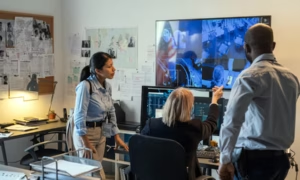The Middle East has long been a region defined by its abundant natural resources, particularly oil and gas. For decades, these industries have formed the backbone of its economic strength, shaping both regional dynamics and global influence. However, the tide is now turning. A new force is reshaping the Middle East’s economic landscape—artificial intelligence (AI). The rapid surge of AI investments is not only transforming traditional sectors but also laying the groundwork for a diversified, future-proof economy.
Countries such as the UAE, Saudi Arabia, and Qatar are leading the charge, each adopting its own strategies to position themselves as AI hubs. But how are these nations balancing competition and collaboration? More importantly, how will AI adoption influence the long-term goal of reducing dependence on natural resources?
The Race to Become the Middle East’s AI Powerhouse
The Middle East’s ambition to become a global AI hub is clear, with each country following a unique approach. The United Arab Emirates (UAE) has taken significant steps with its National AI Strategy 2031. This bold initiative aims to integrate AI into every aspect of society, from government services to healthcare and education. The UAE further solidified its commitment by appointing the world’s first Minister of AI, showing its determination to lead the global AI sector.
In parallel, Saudi Arabia is progressing with its Vision 2030 plan. Central to this initiative is digital transformation, where AI plays a critical role in economic growth. One of the standout examples is NEOM, a smart city built from the ground up. Powered by AI, NEOM represents Saudi Arabia’s ambition to blend technology with sustainability and innovation.
Qatar is also pushing forward with its Qatar National Vision 2030, which emphasises AI research and development. Institutions such as Qatar Foundation and the Qatar Computing Research Institute (QCRI) are playing pivotal roles in advancing AI across multiple sectors, including healthcare, logistics, and climate science.
While these countries compete to establish themselves as AI hubs, there is also growing collaboration. Platforms like the Arab AI Summit encourage knowledge sharing and cooperation across borders. This mix of competition and collaboration could well position the Middle East as a global leader in AI, much like its dominance in energy markets in previous decades.
AI’s Disruption of Traditional Middle Eastern Industries
AI is already having a profound impact on traditional industries in the Middle East. The oil and gas sector is undergoing a technological shift. Predictive analytics and machine learning are being used to optimise extraction and production processes. This makes operations more efficient and cost-effective. AI is also playing a crucial role in reducing environmental impacts by closely monitoring energy usage and emissions.
In finance, AI is transforming how banks operate. Fintech innovation is booming, particularly in Saudi Arabia and the UAE, where AI is helping to personalise customer experiences and enhance fraud detection. AI-driven tools enable banks to streamline compliance and risk management while offering tailored financial services to individual customers.
Retail is another sector where AI is making waves. E-commerce has grown rapidly in the region, and retailers are using AI to enhance customer engagement through personalisation. By better understanding consumer behaviour, businesses can optimise their inventory, predict demand, and reduce operational costs. As the region’s young, tech-savvy population continues to demand digital-first experiences, AI is becoming critical to staying competitive in the market.
Driving Economic Diversification Through AI
One of the most significant effects of AI in the Middle East is its role in economic diversification. Many economies in the region have historically relied on oil and gas revenues. However, there is increasing recognition that this reliance is unsustainable. AI presents a key opportunity to diversify by driving innovation in new sectors.
Industries like healthcare, logistics, and education are already experiencing rapid AI-driven growth. In healthcare, AI is transforming diagnostics, enabling faster and more accurate decision-making. AI-powered platforms can analyse patient data to provide personalised treatment plans, ushering in a new era of personalised medicine.
Logistics is also benefiting from AI. Companies are using it to optimise supply chains, reduce costs, and improve efficiency. Given the Middle East’s strategic location as a global trade hub, AI’s potential in the logistics sector is substantial.
Education is evolving as well, with AI-driven technologies providing personalised learning experiences. These platforms help teachers monitor progress and adapt teaching methods to meet individual students’ needs. AI is playing a crucial role in developing a knowledge-based economy, preparing the region’s workforce for the future.
Empowering Small and Medium-Sized Enterprises (SMEs)
AI is democratising access to advanced technology. Previously, only large corporations could afford to harness the power of AI. Today, small and medium-sized enterprises (SMEs) are gaining access to AI tools that can enhance their operations and increase productivity. This democratisation is particularly important in the Middle East, where SMEs play a key role in economic diversification.
AI-enabled solutions empower SMEs to compete on a global scale, unlocking new opportunities across sectors like retail, finance, and logistics. This, in turn, contributes to the overall goal of building a more resilient and diverse economy.
The Future of AI in the Middle East
As AI continues to embed itself in every aspect of life in the Middle East, its long-term impact on the region’s economic landscape will be transformative. This is the beginning of a new era—one that could rival the discovery of oil in terms of its significance for the region’s future.
However, this AI-driven transformation won’t be without challenges. Countries will need to address concerns about data privacy, job displacement, and ethical AI use. With the right strategies and policies in place, the Middle East has the opportunity to not only lead the global AI economy but also create a more sustainable and diversified future.
The investments being made in AI today will shape the economic futures of these nations. The Middle East is moving beyond its resource-based economy and emerging as a leader in AI innovation, paving the way for sustainable, long-term growth.



































